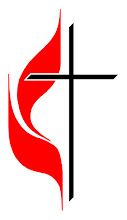Saturday, January 22, 2011
The Lord's Prayer
As we move through the liturgical calendar into the heart of the Epiphany season, the Church School has been hearing the stories of Jesus calling the disciples and the things he teaches them. In the time we have before music begins each Sunday, I have been sharing and talking through the prayer Jesus' teaches his disciples with our children.
As it is something we grown-ups say in Church every Sunday, it tends to be something we don't think much about - as familiar to us as the Pledge of Allegiance or "The Star-Spangled Banner." It is a prayer almost every Christian knows, absorbed largely through osmosis - and we expect our children to learn it in Church School.
In my first professional position as Children's Chaplain, the only "must" in my job description was teaching 3-7 year-olds the Lord's Prayer. It struck me at the time (and it still does now) as a somewhat odd assignment - how do you ask small children who often can't say their first and last names together to stumble through such words as "hallowed," "trespasses," and "temptation?"
Out of this experience came what I call "the Lord's Prayer in a Bag" - an "audience participation" homily with props to help children think, share and learn together what the Lord's Prayer means line by line, taking our time to really explore the "big" words of the prayer, as well as the imagery of the words "Father," "bread," and "Kingdom."
So here is my question for the adults of the SUMC congregation: When was the last time you really spent some time thinking about what the words of the prayer mean? What does it mean for you to "hallow"God's name? By what name do you refer to God? What constitutes your "daily bread?" How do you deal with your "trespasses" as well as those "who trespass" against you? What "tempts you"? From what do you yearn for "deliverance?" And just what does God's "Kingdom" look like to those of us who live in a democracy? And did you notice that this a prayer to be prayed corporately? We address "Our Father" and "forgive those who trespass against us" What does this mean in a culture that celebrates the individual?
They aren't easy questions, are they? There is an awful lot of meat in this one prayer - and that is why the Church incorporates it into is regular worship and why we are taught it. So I hope that you will spend some time this week thinking about the prayer: how does it speak to your life? Invite your children into your discussion - I've been listening to them for the past several weeks and they have a lot to say and share. And when you are finished talking together, say the prayer together . . .
Grace and peace,
Elizabeth
As it is something we grown-ups say in Church every Sunday, it tends to be something we don't think much about - as familiar to us as the Pledge of Allegiance or "The Star-Spangled Banner." It is a prayer almost every Christian knows, absorbed largely through osmosis - and we expect our children to learn it in Church School.
In my first professional position as Children's Chaplain, the only "must" in my job description was teaching 3-7 year-olds the Lord's Prayer. It struck me at the time (and it still does now) as a somewhat odd assignment - how do you ask small children who often can't say their first and last names together to stumble through such words as "hallowed," "trespasses," and "temptation?"
Out of this experience came what I call "the Lord's Prayer in a Bag" - an "audience participation" homily with props to help children think, share and learn together what the Lord's Prayer means line by line, taking our time to really explore the "big" words of the prayer, as well as the imagery of the words "Father," "bread," and "Kingdom."
So here is my question for the adults of the SUMC congregation: When was the last time you really spent some time thinking about what the words of the prayer mean? What does it mean for you to "hallow"God's name? By what name do you refer to God? What constitutes your "daily bread?" How do you deal with your "trespasses" as well as those "who trespass" against you? What "tempts you"? From what do you yearn for "deliverance?" And just what does God's "Kingdom" look like to those of us who live in a democracy? And did you notice that this a prayer to be prayed corporately? We address "Our Father" and "forgive those who trespass against us" What does this mean in a culture that celebrates the individual?
They aren't easy questions, are they? There is an awful lot of meat in this one prayer - and that is why the Church incorporates it into is regular worship and why we are taught it. So I hope that you will spend some time this week thinking about the prayer: how does it speak to your life? Invite your children into your discussion - I've been listening to them for the past several weeks and they have a lot to say and share. And when you are finished talking together, say the prayer together . . .
Grace and peace,
Elizabeth
Subscribe to:
Post Comments (Atom)



No comments:
Post a Comment